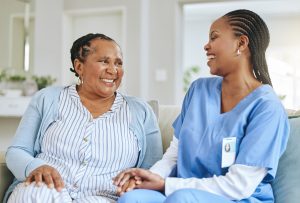Language, Lemonade, and Trust
M showed up with pain—and a warning.
I was volunteering at our annual community health screening, handing out produce as neighbors trickled in. She stood a little apart, gaze steady, as if measuring what this space might expect of her.
“My sister-in-law told me to come,” she said, avoiding eye contact. “She said, ‘Go fix this pain, if it’s even real.’”
That phrase hung in the air. It wasn’t just the heat that made her uncomfortable. Her pain had been questioned so often that even her own family doubted it.
When she asked if we had a women’s doctor, I explained that no OB/GYNs were on site, but family medicine physicians were available. She hesitated. Then, after a long pause said “Take me there.”
I escorted her to the mobile clinic parked in the yard. From my station at the food table, I noticed she never went in. She stood outside, alone.
I walked back. “Is everything okay?” I asked. Her eyes were glassy. We sat down in the shade, and I handed her a cup of lemonade.
“It won’t make a difference,” she said, barely above a whisper. “They never listen. They always think it’s in my head.”
The words hit hard, not because they were new, but because I’d heard versions of them from so many women, especially women of color.
As we talked, she told me she was Haitian and how glad she was to have moved to a neighborhood where she could still speak her language. I shared that I speak Mauritian Creole. Her eyes lit up. We traded words, laughed about the similarities. It wasn’t just a moment of levity, it was a moment of relief. A rare space where she didn’t have to explain herself.
She opened up about her endometriosis, the gut-wrenching, days-long pain she’d been told to endure as if it were normal. She told me about the creative ways she coped that sometimes made things worse before they helped. Then, almost shyly, she shared a dream. “Once I’m free of this pain,” she said, “I want to visit every national park in the United States.” There was light in her eyes when she said it, the kind that only shows up when someone imagines something better.
“People say pain is just part of being a woman,” she said. “Do you believe that?” I asked.
“No,” she replied. “God didn’t put me on this earth to suffer like this.”
“I’m sorry,” I told her. “For everyone who made you feel like your pain didn’t matter. I believe you.”

Eventually, she asked me to walk her to the van. This time, she stepped inside.
I didn’t do anything. I didn’t convince her with evidence or push her with urgency. I simply stayed and listened. That moment reshaped how I understood professionalism: sometimes, showing up without answers is the most professional thing you can do.
Professionalism isn’t found in performance, but in presence. Not in always knowing what to say, but in being brave enough to say nothing at all.
Medical professionalism today is shifting. It’s less about authority, more about accountability. Less about expertise alone, more about empathy. For M, trust didn’t come from credentials, it came from feeling seen.
Her mistrust wasn’t irrational. It was earned through years of being dismissed. It wasn’t resistance. It was protection. And it reminded me that trust isn’t given. It’s built. Slowly. Earned through consistency, humility, and time.
M and I were the same age—two children of islands, raised oceans apart but shaped by stories of strength, resilience, and quiet endurance. At that moment, we weren’t roles or labels. We were simply two people, meeting in a shared space of vulnerability, trying to make sense of a system that hadn’t always made room for voices like ours.
I never heard what her doctors said inside the van. But I remember the silence before, when two strangers sat in the heat and listened each other into visibility.
As I move forward in medicine, I carry her story like a thread woven into my own. M reminds me that trust didn’t come through answers. It came through shade, silence, language, and lemonade. No diagnosis. No cure. Just two people, seen.
Ashwarya Devason is a first-year student in the Harvard/MIT MD-PhD program, where she plans to pursue a PhD in neuroscience. Originally from Mauritius, she completed both her undergraduate and master’s degrees at the University of Pennsylvania. As an aspiring physician-scientist, Ashwarya is committed to translating discoveries from bench to bedside and addressing health care challenges through an interdisciplinary lens grounded in social determinants of health.

